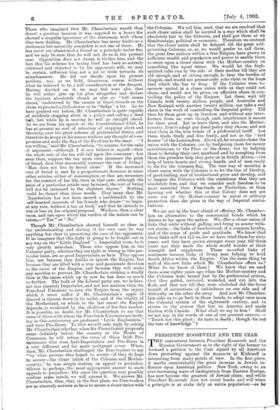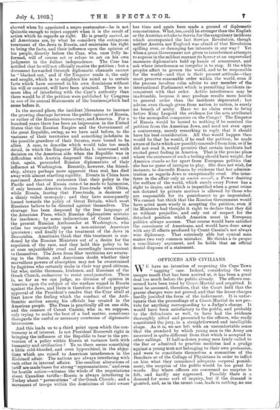PRESIDENT ROOSEVELT AND THE CZAR. T HE controversy between President Roosevelt
and the Russian Government as to the right of the former to forward a petition to the Czar signed by all American Jews protesting against the massacre at Kishineff is interesting from many points of view. In the first place, it marks unmistakably the great increase in Jewish in- fluence upon American politics. New York, owing to an ever-increasing wave of immigration from Eastern Europe, has now become the greatest of Jewish cities; and while President Roosevelt does not count heads, and will when a principle is at stake defy an entire population—as he- showed when ho appointed a neg,ro postmaster—he is not Quixotic enough to reject support when it is the result of action which he regards as right. He is greatly moved, as all Americans are, by what he considers the outrageous treatment of the Jews in Russia, and maintains his right to bring the facts, and their influence upon the opinion of his people, directly before the Czar, who, once fully in- formed, will of course act or refuse to act on his own judgment in the fullest independence. The Czar has notified that he will not officially receive the petition ; but a document forwarded through diplomatic channels cannot be "blacked out," and if the Emperor reads it, the only end sought, which is to enlighten his mind as to certain facts which have occurred in his own dominions without his will or consent, will have been attained. There is no more idea of interfering with the Czar's authority than there would be if the petition were published by Congress in olio of its annual Statements of the businessjwhich had come before it.
• In the second place, the incident ;threatens to increase the growing cleavage between the public opinion of Russia, or rather of the Russian bureaucracy, and America. For a hundred years there has been an impression in the United States that the Russian Empire and the Government of the great Republic, owing, as we have said before, to the vastness of their territories and something indefinite in the possible grandeur of their futures, were bound to be allies. A case, to describe which would take too much detail, in which the Emperor Nicholas I. intervened with decision on the American side when the Republic was in difficulties with Austria deepened this impression ; and that, again, persuaded Russian diplomatists of their influence at Washington. Recently, however, the friend- ship, always perhaps more apparent than real, has died away with almost startling rapidity. Events in China have convinced American statesmen that their policy in the Pacific and that of Russia cannot be made to harmonise, if only because America desires Free-trade with China, while Russia, fearing that Free-trade, is desirous of a thinly veiled monopoly ; and they have consequently leaned towards the policy of Great Britain, which most Russians believe to he directed against themselves. The cleavage has been deepened by the free language of the American Press, which Russian diplomatists mistake for insolence; by some indiscretions of Count Cassini, the present Russian Ambassador at Washington, who relies too unguardedly upon a non-existent American ignorance ; and finally by the treatment of the Jews in Bessarabia. Americans think that this treatment is con- doned by the Russian Ministers out of a desire for the expulsion of the race, and they hold this policy to be at once unjustifiably cruel and exceedingly inconvenient to themselves. The Jews from Slav territories are swarm- ing to the States, and Americans doubt whether their marvellous powers of absorption may not be overstrained by fugitives who certainly make in their way good citizens, but who, unlike Germans, Irishmen, and Russians of the Greek Church, endeavour to resist amalgamation. There is, so far as we can judge, no division of opinion in America upon the subject of the warfare waged in Russia against the Jews, and there is therefore a distinct popular approval of the President's resolve that the Czar shall at least know the feeling which the conduct of the Anti- Semitic section among his officials has created in the American people. The Press is practically all on one side, and the censure of Count Cassini, who is, we suppose, only trying to make the best of a bad matter, sometimes disregards the useful or necessary courtesies of diplomatic intercourse.
And this leads us to a third point upon which the con- troversy is of interest. Is not President Roosevelt right in bringing the influence of the Republic to bear in the pre- vention of a policy within Russia at variance both with humanity and civilisation ? To us there seems something a little cold-blooded, and even hypocritical, in the objec- tions which are raised to American interference in the Kishineff affair. The nations are always interfering with each other in internal affairs. The smallest alterations of tariff are made bases for strong " representations," and even for hostile action—witness the whole of the negotiations about Canadian tariffs—Russia is always interfering in Turkey about " persecutions " of the Greek Church ; and a movement of troops within the dominions of their owner has time and again been made a ground of diplomatic remonstrance. What, too, could he stronger than the English or the Austrian rebuke to Servia for the sanguinary incidents which accompanied the last Servian Revolution, though neither Austria nor England was afraid of that Revolution spilling over, or damaging her interests in any way ? Yet when a great Government not given to interference attempts to express in the mildest manner its horror at an unprovoked massacre diplomatists hold up hands of amazement, and ask where interference so irregular is to stop. If the white peoples affect to govern the world, and to be responsible for the world—and that is their present attitude—they must preserve reasonable order within the world, even if the process involves calm advice to any member of the international Parliament which is permitting incidents in- consistent with that order. Active interference may be inadvisable, because it may produce results more hostile to general order than the incidents deprecated ; but advice, even though given from nation to nation, is surely no breach of amity. Have we no claim even to bring before King Leopold the evidence for the acts attributed to the monopolist companies on the Congo ? The Emperor of Russia would be bound to nothing if he received the petition from the American Jews, and need not even open a controversy, merely remarking in reply, that it should have his best consideration. All that would happen then would he that he would, if he read the petition, be made aware of facts which are possibly c,oncealed from him, or if he did not read it, would perceive that certain incidents had excited great feeling in America. That is the precise place where the existence of such a feeling should have weight, for America stands so far apart from European politics that she has no game of intrigue to play. She does not wish, for instance, to discredit Russia by evidence that her adminis- tration as regards Jews is exceptionally cruel. She inter- feres in the affair only as arnica mundi, a Power desiring the welfare of the world, which surely every Power has a right to desire, and which is imperilled when a great crime not dictated by private motives is allowed by those who are responsible for its punishment to go unpunished. We cannot but think that the Russian Government would have acted more wisely in accepting the petition, even if its Ministers had thought it right to declare that they did so without prejudice, and only out of respect for the detached position which America must in European politics always assume. That course would have satisfied the conscience of Americans, and would have done away with any ill effects produced by Count Cassini's not always wise diplomacy. That extremely able but cynical man makes two very common mistakes. He thinks a tu quoque a conciliatory argument, and he holds that an official denial disposes of a statement.











































 Previous page
Previous page